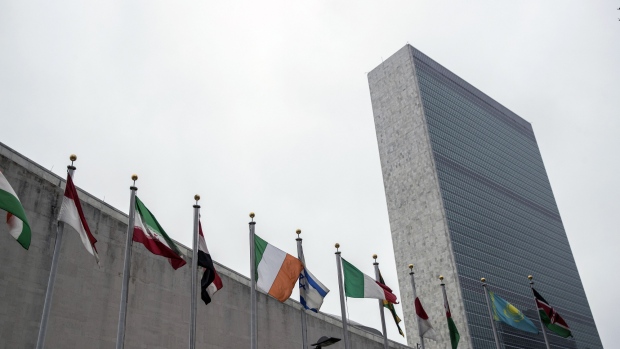Sep 11, 2019
China Fights U.S. on ‘Belt and Road’ Reference in UN Resolution
, Bloomberg News

(Bloomberg) -- Chinese and U.S. diplomats are at loggerheads over Beijing’s insistence on including a reference to its Belt and Road Initiative in the text of a United Nations resolution on Afghanistan, the latest front in a struggle between the two superpowers over China’s sprawling infrastructure program.
The U.S. and its Western allies, including the U.K., have indicated they won’t include language supportive of the Chinese initiative in a resolution renewing the UN mission in Afghanistan, which expires on Sept. 17, according to three diplomats familiar with the debate. China is warning it won’t back down, a sign it could veto the resolution, the diplomats said, requesting anonymity to discuss ongoing negotiations.
The diplomats said there was still time to find a compromise on the text, though countries could also just roll over the UN mission’s term for six months without an agreement on the language.
The clash comes at a delicate time for Afghanistan. The Kabul government is seeking to hold presidential elections this month amid continuing violence and U.S. efforts to reach a deal with the Taliban that would allow President Donald Trump to deliver on his election pledge to withdraw forces still in the country.
Last week, Trump abruptly called off a secret plan to host Taliban and Afghan government leaders at the Camp David presidential retreat.
The text on the UN mission to Afghanistan has referred to the Belt and Road Initiative since 2016, but starting in March, the U.S. said it wouldn’t agree to include that language, forcing a temporary rollover of the mission for six months, instead of one year.
“We strongly believe this mandate is too important at this moment to have one Security Council member deny consensus for reasons having nothing to do with,” the mission, U.S. Ambassador Jonathan Cohen said at a UN Security Council briefing on Tuesday. “ All of us must display discipline and the political will to focus the mandate on the core issues that will empower” the mission.
The American mission to the UN declined to comment. China’s mission to the UN did not immediately respond to a request for comment.
China borders Afghanistan and sees Central Asia as a crucial part of its plan to recreate ancient Silk Road trading routes to the Middle East and Europe.
To contact the reporter on this story: David Wainer in New York at dwainer3@bloomberg.net
To contact the editors responsible for this story: Bill Faries at wfaries@bloomberg.net, John Harney
©2019 Bloomberg L.P.